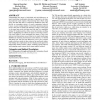Free Online Productivity Tools
i2Speak
i2Symbol
i2OCR
iTex2Img
iWeb2Print
iWeb2Shot
i2Type
iPdf2Split
iPdf2Merge
i2Bopomofo
i2Arabic
i2Style
i2Image
i2PDF
iLatex2Rtf
Sci2ools
WSDM
2012
ACM
2012
ACM
Large-scale analysis of individual and task differences in search result page examination strategies
Understanding the impact of individual and task differences on search result page examination strategies is important in developing improved search engines. Characterizing these effects using query and click data alone is common but insufficient since they provide an incomplete picture of result examination behavior. Cursor- or gaze-tracking studies reveal richer interaction patterns but are often done in small-scale laboratory settings. In this paper we leverage large-scale rich behavioral log data in a naturalistic setting. We examine queries, clicks, cursor movements, scrolling, and text highlighting for millions of queries on the Bing commercial search engine to better understand the impact of user, task, and user-task interactions on user behavior on search result pages (SERPs). By clustering users based on cursor features, we identify individual, task, and user-task differences in how users examine results which are similar to those observed in small-scale studies. Our findings ...
Commercial Search Engine | Cursor Movements | Data Mining | Information Storage And Retrieval | WSDM 2012 |
| Added | 25 Apr 2012 |
| Updated | 25 Apr 2012 |
| Type | Journal |
| Year | 2012 |
| Where | WSDM |
| Authors | Georg Buscher, Ryen W. White, Susan T. Dumais, Jeff Huang |
Comments (0)

